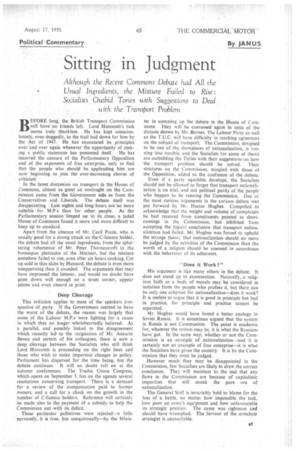‘ Sitting in Judgment Although the Recent Commons Debate had All
Page 39

If you've noticed an error in this article please click here to report it so we can fix it.
the Usual ingredients, the Mixture Failed to Rise: Socialists Outbid Tories with Suggestions to Deal with the Transport Problem
By JANUS
BEFORE long, the British Transport Commission will have no friends left. Lord Hurcornb's task seems truly thankless. He has kept conscientiously, even doggedly, to the trail laid down for him by the Act of 1947. He has enunciated its principles over-and over again whenever the opportunity of making a public statement has presented itself. He has incurred the censure of the Parliamentary Opposition and of the exponents of free enterprise, only to find that the people who should be applauding him are now beginning to join the ever-increasing chorus of criticism,
In the latest discussion on transport in the House of Commons, almost as great an onslaught on the Commission came from the Government side as from the Conservatives and Liberals. The debate itself was disappointing. Late nights and long hours are no more suitable for M.P.s than for other people. As the Parliamentary session limped on to its close, a jaded House of Commons found it more and more difficult to keep up to standard.
Apart from the absence of Mr. Cecil Poole, who is usually good for a strong attack on the C-licence holder, the debate had all the usual ingredients, from the spluttering vehemence of Mr. Peter Thorneycroft to the homespun platitudes of the Minister, but the mixture somehow failed to rise, even after six hours cooking. Cut up cold in thin slabs by Hansard, the debate is even more unappetizing than it sounded. The arguments that may have impressed the listener, and would no doubrhave gone down well enough on a street corner, appear jejune and even absurd in print.
Deep Cleavage
This criticism applies to most of the speakers irrespective of party. If the Government seemed to have the worst of the debate, the reason was largely that some of the Labour M.P.s were fighting for a cause in which they no longer wholeheartedly believed. As a parallel, and possibly linked to the disagreement which recently led to the resignation of Mr. Aneurin Bevan and certain of his colleagues, there is now a deep cleavage between the Socialists who still think Lord Hurcomb is proceeding on the right lines and those who wish to make important changes in policy. Parliament has 'dispersed for the time being, but the debate continues. It will no doubt roll on at the autumn conferences. The Trades Union Congress, which opens on September 3, has on the agenda several resolutions concerning transport. There is a demand for a review of the compensation paid to former owners, and a call for a check on the growth in the number of C-licence holders. Reference will certainly be made also to the payment of a subsidy to help the Commission out with its deficit.
These particular palliatives were rejected—a little nervously, it is true, but unequivocally—by the Minis ter in summing up the debate in the House of Commons. They will be canvassed again in spite of the distaste shown by Mr. Barnes. The Labour Party as well as the T.U.C. will have difficulty in reaching agreement on the subject of transport. The Commission, designed to be one of the showpieces of nationalization, is running into trouble, and the Socialists (or some of them) are outbidding the Tories with their suggestions on how the transport problem should be solved. Their strictures on the Commission, mingled with those of the Opposition, added to the confusion of the debate.
Even if a party squabble develops, the Socialists should not be allowed to forget that transport nationalization is on trial, and not political purity of the people' who happen to be running the Commission. One of the most curious arguments in the curious debate was put forward by Mr. Hector Hughes. Compelled to acknowledge that the weight and volume of complaints he had received from constituents pointed to shortcomings in the Commission, but inhibited -from accepting the logical conclusion that transport nationalization had failed, Mr. Hughes was forced to uphold the strange theory that nationalization should no more be judged. by the activities of the Commission than the worth of a religion should be assessed in accordance with the behaviour of its adherents.
"Does it Work ? "
His argument is like many others in the debate. It does not stand up to examination. Naturally, a religious faith or a body of morals may be considered in isolation from the people who profess it, but there can be only one criterion for nationalization—does it work? It is useless to argue that it is good in principle but bad in practice, for principle and practice cannot be separated.
Mr. Hughes would have found a better analogy in Soviet ,Russia. It is sometimes argued that the system in Russia is not Communism. The point is academic for, whatever the system may be, it is what the Russians have got. In the same way, whether or not the Commission is an example of nationalization—and it is certainly not an example of free enterprise—it is what the Socialists have given the country. It is by the Commission that they must be judged.
However much they may be disappointed in the Commission, few Socialists are likely to draw the correct conclusion. They will maintain to the end that any flaws in the Commission are because of capitalistic impurities that still streak the pure ore of nationalization.
The General Staff is invariably held to blame for the loss of a battle, no matter how impossible the task, how poor an army's equipment and how unfavourable its strategic position. The cause was righteous and ,should have triumphed. The fervour of the armchair strategist is unassailable.




















































































